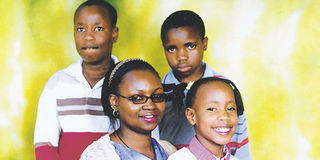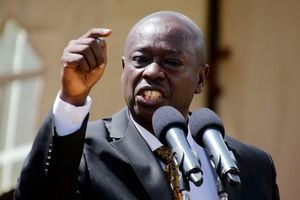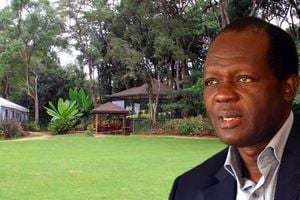He was wheeled into theatre, then he was no more

Back from left: Martin and Erick. Seated: Shania and their mother. When Erick Kimotho was wheeled into theatre in December last year for corrective surgery, her mother knew the son’s misery would soon end. But something went awfully wrong and doctors could do nothing to save his young life. What happened inside that room? Photo/FAMILY ALBUM
Miriam Warorua remembers vividly the hour her son went under the knife for corrective surgery last year. It was a moment everyone in the family, including the young boy, had waited for eagerly. But things turned awry during surgery and the joyous young man succumbed to breathing complications. What went wrong?
Mummy, will we find Erick there?” nine–year-old Shania asks her mother every time they go to a funeral. “And it breaks my heart,” says Mirriam Warorua, fighting back tears.
Shania’s brother died in a hospital bed last year due to breathing complications during a surgery gone wrong. Doctors wanted to correct his stiff, bent hands that were as a result of Juvenile Rheumatoid Arthritis (JRA).
Eric Kimotho had developed the condition despite a normal birth at 3.6 kilos. The illness, which partly manifests itself as stiffened joints, is described as a long-term, chronic, disease resulting in joint pain and swelling because of the body’s immune system mistakenly attacking and destroying healthy body tissue.
At first, it was the constant fever, then came the inexplicable stiffening of joints. A doctor Mirriam consulted began treating Eric for Malaria and prescribing anti-inflamatories, but nothing changed.
Her determination sent her packing every so often for a five-hour long trip from her home in Eldoret to visit a doctor in Nairobi “just to find out what was wrong with my son”.
When the condition was finally diagnosed, Erick was immediately put on medicine as the disease is “treated as it presents itself,” she explains.
When her second son, Martin, was five years old, Miriam noticed that he had surpassed Eric in growth, his appetite ravenous. But soon after he started his medical regimen, Erick was no longer lean. These were the visible side effects of the drugs.
“I had read all the books I could find on JRA, and every medicine prescribed to my son was consistent with the journals. I did not see any cause to worry,” she recalls.
But doctors advised her to wean him off the drugs. “It took me a whole year to get him completely clean. In the end, I had to crush the pills to give him a quarter of a quarter.”
In the meantime, Erick was facing the arthritis bravely. He grew up ‘googling’ his illness and couldn’t wait to share what he learnt with his mother when she got home from work. He became a walking dictionary, a medical encyclopaedia.
But he was not Mirriam’s only concern. Her other children, Martin and Shania, also needed special attention. Martin suffers from Attention Deficit Hyperactivity Disorder, commonly referred to by the abbreviation ADD.
The condition is a psychiatric disorder, mostly diagnosed in children, that is characterised by inattentiveness, over-activity, impulsivity, or a combination of these.
As for Shania, she battles Dyslexia every day, a developmental reading disorder that occurs when the brain does not properly recognise and process certain symbols.
There is no doubt that Mirriam’s hands were full and, to make the matter worse, her husband couldn’t take it anymore. He died.
Mirriam had been living and working in Eldoret since 1991, and so she witnessed the 1992 post-election violence when she was fresh from college.
In 1997, she became conscious, afraid even, because she had young children and fresh investments in the area. In 2007, her fears became just too real.
“Word had gone round that there were people coming. I kept wondering which of my children I would hold… Eric, Martin or Shania?
And so she picked an escape route in her compound and patiently took her children through a drill that she imagined would lead them to safety. That was before they heard on the radio of the church that was set ablaze.
“I knew that if they could burn a church, then they could burn anything. What was to stop them?” she recalls the thought that sent her packing overnight bags for her kids as they made their way to the Eldoret club. There, they found safety, but ran out of food on the third day.
“Things were so bad that I decided to charter a plane. Only one company responded, allowing us to pay on arrival in Nairobi, where friends and family helped us offset the bill.”
In Nairobi, she started feeling the pain of exile. “I frequently asked my children to stay in the room so as to not disturb anyone.”
The family got by, mostly because her boss agreed to give her a transfer, and when she got a better job, things began to look up.
Erick had looked forward to turning 17 because his physician had long advised that he could then undergo corrective surgery.
It would be a good break from the constant medication. And so when the day came, he was excited. So much so that he asked his mother to take ‘before’ photos of him in his robe.
At the hospital, they wished him well. That was at 11 am on December 15, 2010. Mirriam sat close by, waiting, watching the door, hoping to see his son come out, waving, or, at the very least, breathing.
An hour passed. Then two. Then three, by which time she was overwhelmed with worry and so she dialled the surgeon’s number. He wasn’t even in the building.
“Go and check on your son,” he told her, adding: “we wound up the procedure a long time ago, I’m in a different hospital now.” How was that possible, Miriam wondered and headed for the ward.
But Erick wasn’t there. “I asked one of the employees who wheel patients in and out of the theatre. He responded by asking if I was referring to the one who had breathing complications. I didn’t think he was referring to my son until another guy confirmed that he was the one,” she explains.
Then Miriam thought to call the anaesthetist, to whom she had earlier been introduced as the one to assist in the surgery. He too wasn’t in the vicinity. He’d rushed off to his next patient, in a different hospital.
Although the anaesthetist made his way back at 5 o’clock to explain that Erick had developed Pulmonary Oedema, which simply means water had welled up in his lungs while in theatre, this information reached his mother long after she had spent many anxious hours inquiring from nurses and attendants as to why Erick was not coming out of the theatre.
Miriam was later alerted that her son had been wheeled to the High Dependency Unit and had a gas mask over his face.
When she finally saw Erick at the HDU at 5.30 pm, it was only a short while before he woke up and asked for her. He asked that the uncomfortable mask be removed, “even if just for 10 seconds”.
At about 8.30 pm, an Ear, Nose and Throat Surgeon decided to perform a life-saving procedure (Tracheotomy) to create a direct supply of oxygen to Erick’s lungs, but it was too late and Erick gave up the fight 20 minutes later.
Mirriam’s family and friends, who had by then gathered at the hospital, were cautioned against taking notes as the doctor gave his account. The Matron, Miriam says, was the only one scribbling.
When DN2 reached the hospital’s CEO for a comment, he said he didn’t need to look at Erick’s records for him to give an answer.
While he remained mum on the circumstances surrounding the boy’s death, he explained that the hospital could only issue medical records to its patients. And since the patient is no more, he said, it has to go through the right procedure.
The CEO said the hospital “gave the medical reports to Miriam’s lawyer through their insurance company.”
“There is a reason why hospitals and doctors take insurance covers,” he added, saying it was difficult to get to the bottom of a “case of this sort”.
The pathologist report cites the cause of death as anaesthetic complications during the procedure.




